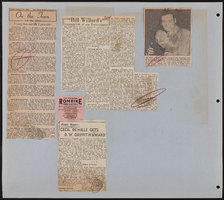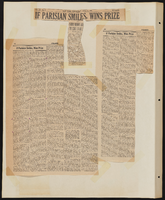Search the Special Collections and Archives Portal
Search Results
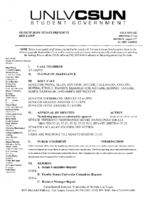
Meeting minutes for Consolidated Student Senate, University of Nevada, Las Vegas, August 27, 2007
Date
2007-08-27
Archival Collection
Description
Includes meeting agenda. CSUN Session 37 Meeting Minutes and Agendas.
Text
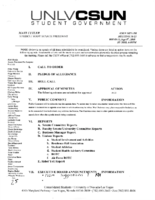
Meeting minutes for Consolidated Student Senate, University of Nevada, Las Vegas, September 08, 2008
Date
2008-09-08
Archival Collection
Description
Includes meeting agenda. CSUN Session 37 Meeting Minutes and Agendas .
Text
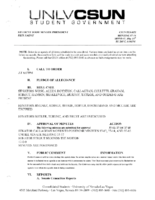
Meeting minutes for Consolidated Student Senate, University of Nevada, Las Vegas, May 14, 2007
Date
2007-05-14
Archival Collection
Description
Includes meeting agenda. CSUN Session 37 Meeting Minutes and Agendas.
Text
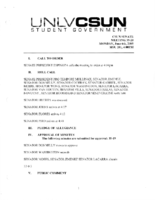
Meeting minutes for Consolidated Student Senate, University of Nevada, Las Vegas, June 06, 2005
Date
2005-06-06
Archival Collection
Description
Includes meeting minutes and agenda. CSUN Session 35 Meeting Minutes and Agendas.
Text

Meeting minutes for Consolidated Student Senate, University of Nevada, Las Vegas, September 01, 1981
Date
1981-09-01
Archival Collection
Description
Includes meeting agenda and minutes along with additional information about the memorandum and aquarian earth fair. CSUN Session 11 Meeting Minutes and Agendas.
Text

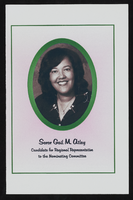
Alpha Kappa Alpha Sorority regional officer candidate brochures
Date
2003-11-16
2004-03-06
2004-03-07
Archival Collection
Description
From the Alpha Kappa Alpha Sorority, Incorporated, Theta Theta Omega Chapter Records (MS-01014) -- Chapter records file.
Text
Pagination
Refine my results
Content Type
Creator or Contributor
Subject
Archival Collection
Digital Project
Resource Type
Year
Material Type
Place
Language
Records Classification


